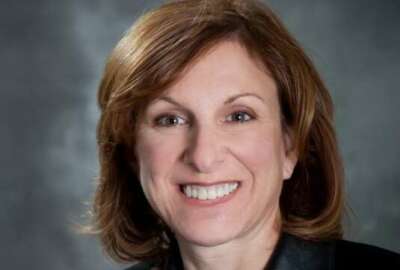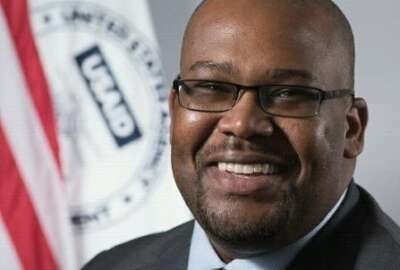
CDC doctor and Sammies finalist helps track over prescribed opioids
It's hard enough to control opioids when illegal imports and dealers flood the market. But all the more so when legal, licensed doctors and pharmacists over...
Best listening experience is on Chrome, Firefox or Safari. Subscribe to Federal Drive’s daily audio interviews on Apple Podcasts or PodcastOne.
It’s hard enough to control opioids when illegal imports and dealers flood the market. But all the more so when legal, licensed doctors and pharmacists over prescribe and deliver them. That’s where Vikram Krishnasamy has helped a lot. He’s a doctor and medical officer for the Centers for Disease Control and Prevention and now a finalist in this year’s Service to America Medals program. He joined Federal Drive with Tom Temin for more details.
Interview transcript:
Tom Temin: Dr. Krishnasamy, thanks for joining me.
Vikram Krishnasamy: Thanks, Tom, for having me.
Tom Temin: So, first of all, tell us how the opioid issue in general is going because it seems to have disappeared from all of the news and all of the media and so forth, because of the coronavirus. But it’s very much with us, the opioid problem, isn’t it?
Vikram Krishnasamy: Overdoses continue to remain a problem in America and opioids specifically are linked to two thirds of drug overdose deaths in the US. So it’s an important issue that we need to continue to remain vigilant in addressing.
Tom Temin: Now your Sammies entry points out that legal doctors – people we trust – have been overprescribing these and pharmacists deliver them, and other people in the licensed and trusted medical chain, to the point where law enforcement had to be involved. So tell us how that happened and what your role was in it.
Vikram Krishnasamy: Yeah, as our colleagues across the country were grappling with the opioid crisis, back a couple years ago, we recognized that there’s a potential to partner with law enforcement agencies. So there may be times when a physician prescribes opioids in a way that’s outside of what we would consider acceptable or outside the standards of care. In those situations, law enforcement agencies, both federal such as the Drug Enforcement Agency, or the HHS Office of Inspector General, as well as state law enforcement agencies may step in to help solve some of these problems. And what happens is that our law enforcement colleagues may go in and shut a clinic down. They may arrest a provider, a health care provider, such as a physician. And in that case, that physician will no longer be seeing those patients and there may be 1,000 patients that are all of a sudden left without a provider. So we needed a way to help those patients that were were affected. And so what we did was work closely with our partners in state health departments to help them prepare for some of these law enforcement actions.
Tom Temin: So helping them prepare might be to also help them get off of the opioids, because I guess the techniques for doing that have come some ways, so they can have their pain management if it’s indicated, but not necessarily with opioids.
Vikram Krishnasamy: Yeah, that’s exactly right, Tom. What we try to do is ensure that patients are taken care of in a safe way. And if they might be on a risky dose, or too high of a dose of opioids that might have been provided by some of these health care providers, we try to provide them or get them to another health care provider that can help manage some of the concerns and health care problems that they – these patients may be facing.
Tom Temin: I guess, you know, doctors can make an honest error from time to time and they do. But what is the motivation that you have found for a physician to overprescribe? It sounds like something deliberate if it rises to the level of law enforcement. What’s their motivation?
Vikram Krishnasamy: Yeah, Tom, you’re asking a great question. Yeah, honestly, I can’t speak to exactly what the motivations might be. I think the overall intent from our standpoint is really trying to help protect some of these patients or all of these patients, and ensure that they have a way forward in terms of making sure their pain is taken care of and that they’re taken care of safely. And working with our state health partners, we were able to at least make sure that these patients are contacted and could at least get to another provider to get some assistance that way.
Tom Temin: And did you ever see instances where the patients and the doctors and the pharmacists, the chain were kind of in collaboration because those pills have a pretty good black market value?
Vikram Krishnasamy: There are times when we were working with our law enforcement colleagues were a health care provider in a clinic, as well as an associated pharmacy were both affected. I will say that I’m not often involved in terms of the relationships between the two. My role was often to help ensure the safety of the patient and to make sure that our state health departments and other agencies at the state level could really be plugged in. I think one of the challenges here in the past has been that these actions may occur and our state health partners may not always be aware, given how some of the actions may have occurred historically. And so our goal was really to help bridge those connections, help everyone prepare and make sure that the safest possible actions are taken.
Tom Temin: We’re speaking with Dr. Vikram Krishnasamy. He’s a medical officer at the Centers for Disease Control and Prevention and a finalist in this year’s Service to America Medals program. So has the work you’ve done become kind of a programmatic, ongoing effort to make sure that law enforcement, CDC and the patient’s – the kind of triangle of care here is maintained perpetually?
Vikram Krishnasamy: Yeah, that’s exactly right, Tom. This is a longstanding effort now between multiple agencies and it gets to a larger issue of how we address drug overdose and the opioid crisis in America. And so there’s a large portfolio of work that goes on at CDC as well as other agencies across the federal government and state and local health jurisdictions to help address this crisis.
Tom Temin: And tell us more about yourself. You are a physician, how did you come to CDC and what’s your basic role there?
Vikram Krishnasamy: Yeah, I came to CDC back in 2015. So about five years ago now. I’m a physician by training, I’m trained in internal medicine and preventive medicine. And I came to CDC to do a physician training program in public health called the Epidemic Intelligence Service. And it’s a great way for physicians to get public health training and to help respond to acute public health crises that we face as a country such as outbreaks.
Tom Temin: And is opioid the only one that you’ve had experience with? There must be others between opioids and coronavirus.
Vikram Krishnasamy: Yeah, I will say I’ve worked on multiple responses for a wide range of topics. So I’ve worked on food borne outbreaks. I’ve worked on Zika and ebola virus. Right now, I’ve done some work on COVID-19. And so a lot of us have done work in multiple areas as we try to scale to the urgent and acute needs of the day.
Tom Temin: And as a medical officer, are you assigned to any particular center because, it’s kind of like NIH – there’s lots of institutes and centers in there.
Vikram Krishnasamy: We do have many, many centers here at the Center for Disease Control in Atlanta, and where I’m assigned is the National Center for Injury Prevention and Control. So that’s my day job though if there’s an urgent area or risk or problem that arises elsewhere, I could be pulled into that work.
Tom Temin: And besides opioids, I guess if you classify that as an injury in a sense, what are the other big public health-level injuries that happen to Americans? I think I once read falling off ladders is like number two, or did I read wrong?
Vikram Krishnasamy: Yeah, I think while opioids and drug overdose are at the forefront, there are a number of other injuries that we’re concerned about such as suicide, or adverse childhood experiences, falls, motor vehicle accidents. So there’s a lot that we don’t necessarily talk about or it may not be on the front page of the news, but are still important factors and to consider as we address the health of all Americans.
Tom Temin: Because that implies that in the case of whatever a given malady or accident or public health threat is, there are also elements of the economy, manufacturers and so on, that need to be part of the solution here, too, just as they are in opioids or in COVID-19.
Vikram Krishnasamy: Yeah. And what I would say is, as we’ve examined these problems, what we realize and what all of our partners realize is that these problems are complex. There is no one way to solve them. Single agencies often can’t solve them alone. And what we need to do is partner together to address the larger problems that we face as a country.
Tom Temin: And as a sleuthing physician with internal medicine training, do you ever get a chance to keep your own chops up by putting a stethoscope on a chest or two?
Vikram Krishnasamy: Yeah, Tom, thanks for raising that. I will say that I love clinical medicine and seeing patients. I still continue to see patients in a free clinic on Sundays here in Atlanta, when I’m able to. Now I will say that COVID-19 just has changed that quite a bit in the way that we’re able to see patients in an outpatient clinic. But I still love to continue to do that work and it’s it’s very meaningful for me.
Tom Temin: Dr. Vikram Krishnasamy is a medical officer for the Centers for Disease Control and Prevention and finalist in this year’s Service to America Medals. Thanks so much for joining me.
Vikram Krishnasamy: Thanks, Tom. Really appreciate it.
Read more about his work here.
Copyright © 2025 Federal News Network. All rights reserved. This website is not intended for users located within the European Economic Area.
Tom Temin is host of the Federal Drive and has been providing insight on federal technology and management issues for more than 30 years.
Follow @tteminWFED





